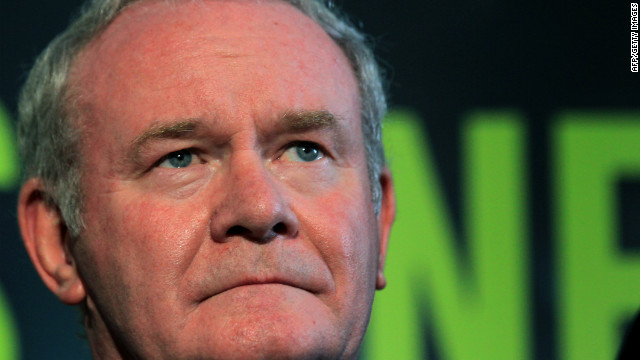
STORY HIGHLIGHTS
- NEW: Sinn Fein leader Gerry Adams says the meeting is part of national reconciliation
- NEW: "This will cause difficulty for Republicans and nationalists," he acknowledges
- Queen Elizabeth II will meet ex-IRA leader Martin McGuinness in Northern Ireland next week
- McGuinness is now a Sinn Fein politician and deputy first minister of Northern Ireland
McGuinness, now a Sinn
Fein politician, is the deputy first minister of Northern Ireland. The
meeting is being seen as highly symbolic.
Sinn Fein President Gerry
Adams confirmed that McGuinness will meet the queen at an event in
Belfast to celebrate art and culture across Ireland.
"Because this involves
Martin meeting the British monarch, this will cause difficulty for
Republicans and nationalists who have suffered at the hands of British
forces in Ireland over many decades," he said in a printed statement.
However, the party had
agreed that McGuinness should meet the queen "in the context of conflict
resolution and national reconciliation, as well as our own republican
national objectives," he said.
The event is not connected with the queen's diamond jubilee celebrations, he said.
"This is a significant initiative involving major political and symbolic challenges for Irish republicans," Adams added.
"As the record of the
peace process demonstrates, Irish republicans have frequently been
prepared to take bold and historic initiatives and risks for peace to
break stalemates and find agreements."
The meeting follows the queen's historic visit to the Republic of Ireland in May of last year.
It was the first visit
by a British monarch to the republic since it gained independence in
1921 and marked a reconciliation between neighboring countries, who once
viewed each with suspicion and hostility.
An IRA bomb killed one
of the queen's relatives, Lord Mountbatten, in 1979. IRA members have
also killed police officers and soldiers in Northern Ireland, who serve
in the queen's name.
The nationalist community in Northern Ireland sees the British as occupiers and wants their rule in the province to end.
McGuinness has admitted
that he was a leader of the Provisional IRA during the 30-year conflict
in Northern Ireland between pro-British and pro-Irish forces.
In recent years, he has
received death threats from hard-line dissident IRA splinter groups
because of his support for the peace process.
He stood for Ireland's
presidency last year but returned to his post as deputy first minister
of Northern Ireland when his campaign was unsuccessful.
Accepting his party's nomination last September, he said republicans have an obligation to "heal the wounds of their actions."
The majority of the
island gained independence in 1921, following two years of conflict, but
six of the nine counties of the province of Ulster chose to stay in the
United Kingdom, eventually becoming the country of Northern Ireland.
In the late 1960s the
conflict between mainly Protestant unionists who want Northern Ireland
to remain part of the United Kingdom and largely Roman Catholic
nationalists who want the North to be reunited with the rest of Ireland
exploded into a political and sectarian war, known as the Troubles.
The three decades of
ensuing violence between the IRA and loyalists claimed the lives of more
than 3,000 people, most of them north of the border, and while the Good
Friday Agreement of 1998 effectively ended the conflict, suspicions
remain. For this reason the queen's state visit is more than symbolic.
Under the terms of the
landmark accord, terrorist groups on both sides dumped their weapons,
and political allies of the two now work together in Northern Ireland's
power-sharing government.
No comments:
Post a Comment